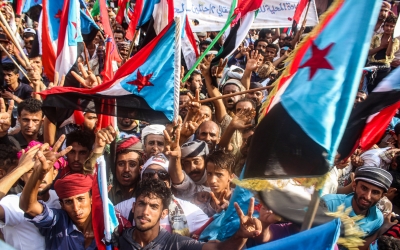Yemen government and southern separatists agree power-sharing deal: Sources

Yemen's southern separatists have agreed a power-sharing deal with the internationally-recognised government to end a struggle for the southern port of Aden that helped to fracture the Saudi-led coalition battling Houthi rebels, sources on both sides said on Friday.
The UAE-backed separatist Southern Transition Council (STC) is nominally allied to the Saudi-backed government of President Abd-Rabbu Mansour Hadi, but the two sides fell out in August, with the separatists seizing control of Aden.
Saudi Arabia has hosted indirect talks between them in an attempt to rebuild the coalition fighting against the Houthis, who expelled Hadi's government from the capital Sanaa five years ago.
The deal would see the STC handed a number of ministries, as well as the government's return to the southern city of Aden, according to official sources and reports in Saudi media.
The so-called Security Belt Forces, trained by the UAE and dominated by the STC, in August took control of Aden, which has served as the beleaguered government's base since it was ousted from the capital.
New MEE newsletter: Jerusalem Dispatch
Sign up to get the latest insights and analysis on Israel-Palestine, alongside Turkey Unpacked and other MEE newsletters
The clashes between separatists and government forces, who for years fought on the same side against the Houthis, had raised fears that the country could break apart entirely.
The warring factions have in recent weeks been holding talks mediated by Saudi Arabia in the kingdom's western city of Jeddah.
The deal between the two sides had been expected to be announced last week.
Deal to be signed 'within days'
An STC official currently in Riyadh told the AFP news agency that the deal had been agreed and he hoped the government would add their signature soon.
"We signed the final draft of the agreement and are waiting for the joint signature within days," he said, adding that both Yemen's President Abedrabbo Mansour Hadi and STC leader Aidarous al-Zoubeidi are expected to attend a ceremony in Riyadh.
A Yemeni government official, declining to be named, confirmed the deal had been agreed and would be signed within days.
It sets out "the reformation of the government, with the STC included in a number of ministries, and the return of the government to Aden within seven days after the agreement being signed," he told AFP.
Saudi Arabia's Al-Ekhbariya state television said a government of 24 ministers would be formed, "divided equally between the southern and northern governorates of Yemen".
Under the deal, the Yemeni prime minister would return to Aden to "reactivate state institutions," it added.
Al-Ekhbariya said the Saudi-led military coalition, which has intervened on the government's side against the Houthis, would oversee a "joint committee" to implement the agreement.
UAE withdrawal
Saudi forces took control of Aden after Emirati troops withdrew from the city earlier this month.
The move seemingly paved the way for ending the crisis that had exposed differences between Riyadh and Abu Dhabi over how to proceed in the wider war that has been in military stalemate for years.
The UAE scaled down its presence in Yemen in June as Western pressure mounted to end the conflict that has pushed millions to the brink of famine.
But Abu Dhabi retains influence through the thousands of Yemeni troops it armed and trained.
Yemen's government has asked the UAE to stop supporting the STC, but Abu Dhabi has criticised Hadi's administration as ineffective and distrusts the Islamists with whom he is allied.
Resolving the power struggle in the south and easing Houthi-Saudi tensions would aid United Nations' efforts to restart peace talks to end the war that has killed tens of thousands.
The Houthis last month offered to stop missile and drone attacks on Saudi Arabia if the coalition ended air strikes on Yemen. Riyadh has said it views the offer "positively".
The rebels, who control Sanaa and most big urban centres, extended the offer after claiming responsibility for a 14 September assault on Saudi oil processing facilities.
Riyadh rejected the Houthi claim of responsibility and blamed Iran for the attacks, a charge Tehran denied.
The Houthis deny being puppets of Iran and say they are fighting a corrupt system, pointing to the standoff in Aden as proof that Hadi is unfit to rule.
Middle East Eye delivers independent and unrivalled coverage and analysis of the Middle East, North Africa and beyond. To learn more about republishing this content and the associated fees, please fill out this form. More about MEE can be found here.






